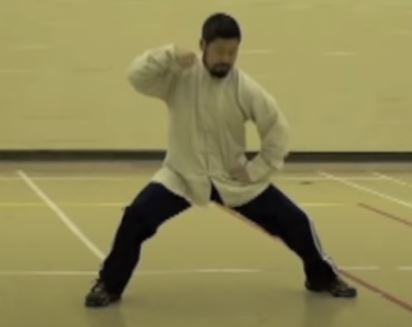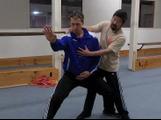Mind-intent is one of the most important ideas in Chen Style Taijiquan learning and practice. It is also one of the most confusing concepts. Let’s take a look at this concept from a simple point of view to facilitate learning.
- The learning of Taijiquan requires that the student have correct mind-intent because Taiji is an internal martial art.
- Mind-intent is to know what you are doing.
- There are many levels of “to know what you are doing”.
- The first level is to simply copy the choreography correctly. In this sense, to know the choreography is to know the meaning. Nothing else should be involved. At this stage avoid this question: What is this move for? Instead ask, “How did you do that?” “Show me how?”
- The second level is to know what you are doing in terms of energy circulation in your own body.
- The third level is to know what you are doing in terms of how your body interacts with your opponent’s body.
- The fourth level is to know what you are doing in terms of how to always make your body the lever and your opponent’s body the load (as in a leverage).
- The fifth level is to accomplish the above naturally. This means that the above scenario will be the case no matter what.
- Mind-intent is not what you think that it should be. It is what the situation requires.
- Mind-intent is not a skill. It is not something you can learn. It is a result. It is like saying that when you walk, your mind is directing it. Therefore, the real mind-intent in walking cannot be felt or known. In most cases, when someone is conscious of an action, it usually mean there is a problem with that action. In this sense, we say, “The real intent is when there is no intent.”
- It is nice to know about this concept but if you focus on it, you are guaranteed to be lost.



{ 5 comments… read them below or add one }
“Mind-intent is not what you think that it should be. It is what the situation requires”.
I’m not sure but maybe it has to do with rhythm.
I am not sure if the term ‘mind-intent’ is related to a previous post that talks about ‘mind of monkey and intent of horse’ which has its Chinese origin as ‘心猿意馬’ (xīn yuán yì mǎ). While ‘心’ literally means ‘heart’ it is quite normal to translate ‘心’ (xin) as ‘mind’ (Chinese do/did use them interchangeably). However, I would like to point out that the word ‘意’ (yi) in this context may mean ‘consciousness’ rather than ‘intent’ and they are not the same thing. ‘Intent’ is directional but ‘consciousness’ is not. ‘心猿意馬’ is more about double emphasis of the uncontrollable aspect of monkeys and horses. Besides, what is the meaning of ‘intent of horse’? To eat grass or to run around?
Is there a different between ‘intent’ and ‘mind-intent’?
Please be aware that I am only commenting on the language aspect, not the practical method. Not sure if I am making things more clear or confused to people who don’t read Chinese.
Mind intent and 心猿意马(mind of money intent of horse) are unrelated concepts.
wonderful, wonderful article. thank you. clarifies a lot of what others make metaphysical
thank you!
有形有意都是假,技到无心此见真
Going through different levels of training, we can get mind-intent in an unexpected way. It is a result not a method. Thanks Master Chen for your great teaching.